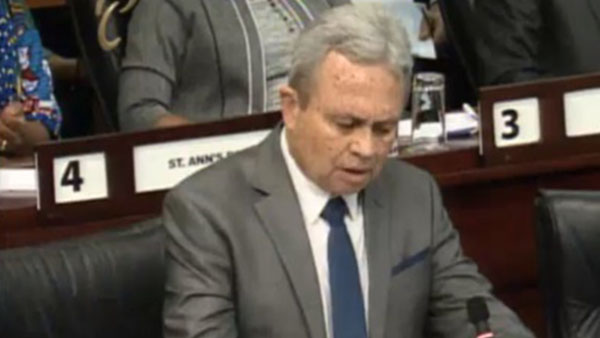PORT OF SPAIN, Trinidad and Tobago, October 5, 2018 (CMC) – The Trinidad and Tobago government, on Monday, presented a TT$51.7 billion budget to Parliament, outlining new taxes, improved tax collection measures and a host of new initiatives to safeguard the disabled community and senior citizens, among others.
Finance Minister, Colm Imbert, in a three-hour presentation, said the prospects for the future “are bright” and that the Keith Rowley government, over the past three years, had been able to turn around the economy and avoid going to the International Monetary Fund (IMF), as had been the case with some Caribbean countries.
Imbert told legislators that total expenditure, for the fiscal period 2019, will continue to be contained, in keeping with the policies of the government and is “budgeted at TT$51.77 billion, a small increase of TT$2.89 billion, over the fiscal 2018 outturn, of TT$48.87 billion”.
He said the 2019 fiscal package is “significantly lower than the TT$62.83 billion achieved in 2014”.
“This is a substantial reduction in expenditure from the 2014 peak level….a reduction of TT$11.06 billion or 21.4 percent,” Imbert said, noting that the fiscal deficit for 2019 is expected to narrow to TT$4.05 billion or 2.5 percent of gross domestic product (GDP), as compared to the fiscal deficit of TT$6.26 billion or 3.9 percent of GDP for fiscal 2018.
He told legislators that the budgeted revenue for 2019 is predicated on an oil price of US$65 per barrel and a gas price of US$2.75 per mmbtu.
“Our assumed gas/oil price is below the International Monetary Fund oil price forecast of US$70 per barrel and also lower than the current oil price forecast, made by the World Bank, by the United States Energy Information Administration and by the International Energy Agency, we are being very careful,” he added.
He said, based on these assumptions, the government is projecting total revenue at TT$47.72 billion, oil revenue at TT$9.51 billion, non-oil revenue TT$35.19 billion and capital revenue TT$3.00 billion.
Imbert told legislators that his government had been seeking to reduce the subsidy on fuel that over the past 16 years had amounted to TT$29 billion and, as a result, “we are taking steps to liberalise the domestic fuel market, with the aim of improving the efficiency of energy use in the country.
He said the de-regulated market will bring to an end the system of fuel subsidies which were introduced in 1974.
But he acknowledged that the subsidy has over the years prevented the governments from providing medicines, pensions, subsidized public transport, subsidized housing and social services and free education among other factors.
“It should also be noted that if oil prices remain above US$70 in the coming year, the fuel subsidy will exceed TT$1.5 billion in 2019 if there is no adjustment to the retail prices of fuel at the pump. It must also be emphasised that rising oil prices do not benefit us in the way that they should because PETROTRIN (the state oil company) which produces almost 60 per cent of the country’s oil simply does not pay its taxes or royalties and thus makes no real positive contribution to the Treasury at this time.”
Imbert said that the government is now moving to increase the cost of a litre of super gasoline from TT3.97 to TT$4.97 cents, while keeping the cost of diesel fuel at the current price of TT$3.41 cents per litre.
“In this way, Madam Speaker, the cost of public transportation and the cost of transport of consumer items, food, goods and material will not be unduly affected, since the vast majority of public transportation vehicles and goods vehicles use diesel fuel,” he said, adding that the increase in fuel prices will go into effect immediately.
“It should be noted, Madam Speaker, that this phased-move to the de-regulation of fuel prices, by keeping the price of diesel unchanged, will cost the Treasury over TT$700 million in 2019,” he said, adding that on an oil price of US$73 a barrel, “the actual unsubsidized price of super gasoline, should really be TT$5.47 cents per litre.
“It will be difficult to find that extra TT$700 million in 2019 to keep the price of diesel fuel at its present level at TT$3.41 cents per litre and to subsidise super gasoline by TT$0.50 cents per litre. But the government is of the view that any adjustment to market prices for fuel must be gradual,” he said, adding that the government would continue to subsidise the price for liquefied petroleum gas “in order to assist the poor and vulnerable”.
The Finance Minister said regarding the collection of taxes, there will be increased penalties and fines, from TT$3,000 to TT$10,000, for submission of incorrect information to the Inland Revenue.
He said the business levy threshold will also be increased from TT$200,000 to TT$360,000, and there will also be increased fines, in respect of fraud from TT$50,000 to TT$250,000 “as the current sanctions are inadequate.”
He said under the Registration of Club Act, the rate of interest for late payment of taxes is being increased from 15 to 20 percent.
Imbert said tax amnesties were granted in an effort to build compliance with the Board of Inland Revenue and while they provide revenue in the short term, “in the longer term they encourage tax payers to avoid compliance.
The Finance Minister said that to help first-time home owners, the stamp duty threshold is increasing from TT$800,000 to TT$1.5 million, and that the government is also increasing the subsidies paid to senior citizens, as well as disability grants to include children, under the age of 18. He said food card grants will also be increased.
 Pride News Canada's Leader In African Canadian & Caribbean News, Views & Lifestyle
Pride News Canada's Leader In African Canadian & Caribbean News, Views & Lifestyle





